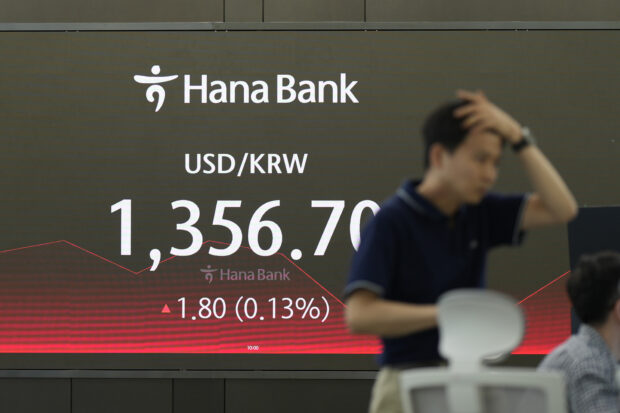
A currency trader walks by the screen showing the foreign exchange rate between U.S. dollar and South Korean won at a foreign exchange dealing room in Seoul, South Korea, Monday, May 20, 2024. (AP Photo/Lee Jin-man)
HONG KONG — Asian stocks advanced Monday after U.S. stock indexes drifted near their records, with the Dow Jones Industrial Average closing above 40,000 for the first time.
U.S. futures rose, and oil prices climbed as investors focused on the Middle East, where a helicopter carrying Iranian President Ebrahim Raisi and other officials crashed in the mountainous northwest reaches of Iran on Sunday.
China’s market extended last week’s gains after the central bank announced new support for the property industry, including cutting required down payments for housing loans, cutting mortgage interest rates for first and second home purchases, and removing a mortgage rate floor.
The Hang Seng in Hong Kong added 0.7 percent to 19,680.31, with its property index up 0.7 percent during afternoon trading. Country Garden Holdings, one of many financially troubled developers, gained 18.5 percent.
The Shanghai Composite index advanced 0.6 percent to 3,172.35.
READ: China rolls out new measures to fix its property crisis, spur growth
On Monday, China’s central bank left the one- and five-year loan prime rate unchanged at 3.45 percent and 3.95 percent, in line with expectations. The one-year LPR serves as the benchmark for most new and outstanding loans in China, while the five-year rate affects the pricing of property mortgages.
In Tokyo, the Nikkei 225 index climbed 0.7 percent to 39,067.45. Australia’s S&P/ASX 200 gained 0.6 percent to 7,864.30. The Kospi in Korea rose 0.5 percent to 2,737.23.
Elsewhere, Taiwan’s Taiex edged 0.1 percent higher after Lai Ching-te was inaugurated as Taiwan’s new president. Lai is expected to uphold the island’s de facto independence policy from China and seek to bolster its defenses against Beijing, which claims the island as Chinese territory.
In Bangkok, the SET was up 0.1 percent.
Wall Street
On Friday, the Dow rose 0.3 percent to 40,003.59, a day after briefly topping the 40,000 level for the first time. It and other indexes on Wall Street have been climbing since the autumn of 2022 as the U.S. economy and corporate profits have managed to hold up despite high inflation, the punishing effects of high interest rates, and worries about a recession that seemed inevitable but hasn’t arrived.
The S&P 500, which is the much more important index for Wall Street and most retirement savers, added 0.1 percent to 5,303.27. It finished just 0.1 percent shy of its record set on Wednesday and closed out a fourth straight week of gains. The Nasdaq composite slipped 0.1 percent to 16,685.97.
Elsewhere in financial markets, Treasury yields ticked higher.
A report last week rekindled hopes that inflation is finally heading back in the right direction after a discouraging start to the year. That in turn revived hopes for the Federal Reserve to cut its main interest rate at least once this year.
The federal funds rate is sitting at its highest level in more than two decades, and a cut would goose investment prices and remove some of the downward pressure on the economy.
Fed’s balancing act
The hope is that the Fed can pull off the balancing act of slowing the economy enough through high interest rates to stamp out high inflation but not so much that it causes a bad recession.
READ: Powell sticks with Fed’s cautious rate-cut strategy
Of course, now that a growing percentage of traders are betting on the Fed cutting rates two times this year, if not more, some economists are cautioning the optimism may be going too far. It’s something that happens often on Wall Street.
While data reports recently have been better than forecast, “better than expected doesn’t mean good,” economists at Bank of America wrote in a BofA Global Research report.
Inflation is still higher than the Fed would like, and Bank of America’s Michael Gapen still expects the Fed to hold its main interest rate steady until cutting in December.
In the bond market, the yield on the 10-year Treasury rose to 4.41 percent from 4.38 percent late Thursday.
In other trading Monday, benchmark U.S. crude oil was up 30 cents at $79.88 per barrel. Brent crude, the international standard, added 33 cents to $84.31 per barrel.
The U.S. dollar rose to 155.75 Japanese yen from 155.55 yen. The euro was up to $1.0882 from $1.0871.